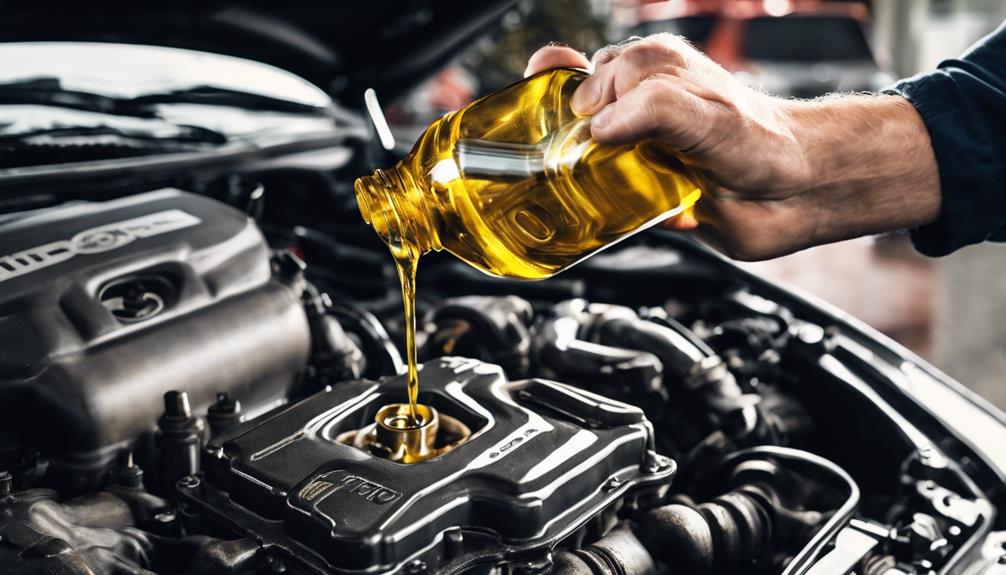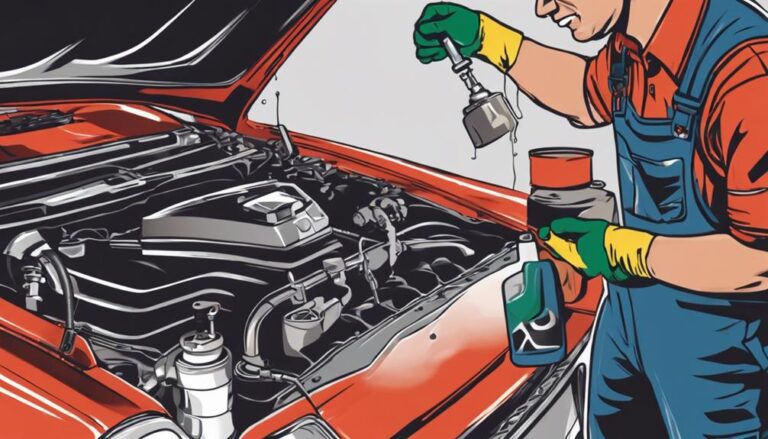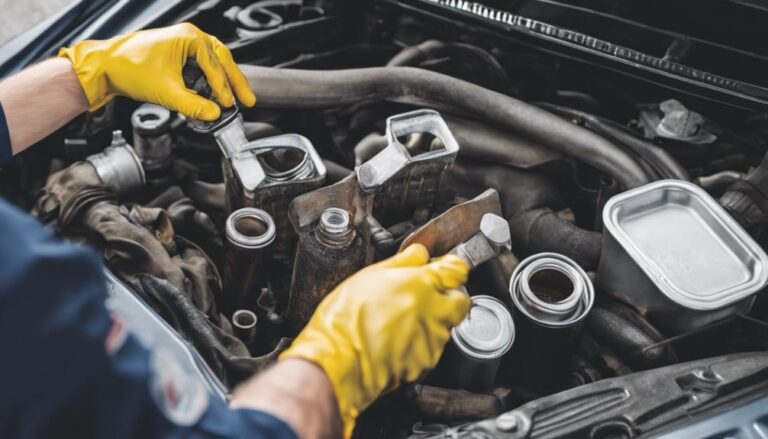Maximizing Car Performance With Timely Oil Changes
When it comes to your vehicle, the choice is simple: neglect your oil changes and risk compromising your car's performance and longevity, or stay on top of this routine maintenance for optimal results.
Curious about how timely oil changes can make a difference in your car's overall performance? Let's explore how this seemingly small task can have significant implications on your driving experience and your wallet.
Key Takeaways
- Regular oil changes optimize engine performance and longevity.
- Timely oil changes reduce friction, heat, and wear on engine components.
- Proper oil changes prevent harmful deposits and sludge for improved performance.
- Regular oil changes enhance fuel efficiency and prolong engine lifespan.
Importance of Regular Oil Changes
Regularly changing your car's oil is a fundamental maintenance task crucial for ensuring peak engine performance and longevity. By adhering to a strict maintenance schedule for oil changes, you contribute to an improved engine that operates efficiently and reliably. Following the manufacturer-recommended intervals for oil changes is essential in preventing unnecessary wear and tear on engine components. Proper lubrication provided by fresh oil helps reduce friction between moving parts, leading to improved fuel efficiency and overall vehicle performance.
Neglecting oil changes can disrupt the smooth operation of your engine, potentially causing costly damage. Timely oil changes ensure that the engine remains clean and well-lubricated, preventing the accumulation of harmful deposits that can hinder performance. By staying proactive with your oil change routine, you safeguard your engine against premature wear and extend its lifespan. Embracing a consistent maintenance schedule for oil changes is key to maximizing your car's performance and reliability on the road.
Signs Your Car Needs an Oil Change
If your car displays dark, gritty oil on the dipstick, it likely indicates possible engine contamination and signals the need for an oil change. Neglecting this warning sign can lead to detrimental effects on your engine longevity. Additionally, engine knocking or ticking noises may suggest insufficient lubrication, emphasizing the significance of maintaining a proper oil change frequency. Addressing these issues promptly not only ensures optimal performance but also contributes to your engine's longevity.
Another critical sign that your car needs an oil change is a decrease in fuel efficiency. Deteriorating oil can increase friction within the engine, causing it to work harder and burn more fuel. This inefficiency can be rectified by timely oil changes, preserving your engine's health and overall performance.
Moreover, an illuminated Check Engine light on your dashboard often points to the necessity of an oil change to maintain your engine's efficiency. Lastly, a burning smell coming from the engine indicates old or dirty oil, prompting the need for immediate attention to ensure your car's longevity and performance.
Role of Motor Oil in Performance

Motor oil plays a crucial role in enhancing the performance and efficiency of your vehicle by reducing friction between engine components. This reduction in friction not only improves efficiency but also contributes to engine protection.
Proper lubrication provided by motor oil facilitates the dissipation of heat, preventing overheating and ensuring optimal operation. Moreover, clean motor oil acts as a protective barrier, minimizing wear on engine parts and maintaining performance levels over time.
By changing the oil regularly, you can prevent the buildup of sludge and contaminants, which in turn preserves engine performance and longevity. It's essential to consider the quality and type of motor oil used as they directly impact the overall performance and efficiency of your vehicle.
Therefore, by prioritizing regular oil changes and selecting the appropriate motor oil, you can significantly contribute to improving efficiency and ensuring proper engine protection for your vehicle.
Consequences of Neglecting Oil Changes
Neglecting timely oil changes in your vehicle can lead to detrimental consequences, including increased friction, heat, and wear on critical engine components. Here are the reasons why staying up to date with oil changes is crucial for your car's performance and longevity:
- Engine Longevity: Regular oil changes help maintain the health of your engine by reducing wear and tear on vital components, ultimately extending its lifespan.
- Maintenance: Ignoring oil changes can result in the accumulation of harmful deposits, which may lead to costly maintenance issues down the line.
- Lubrication: Fresh oil provides optimal lubrication to engine parts, reducing friction and heat generation during operation.
- Protection: Clean oil acts as a protective barrier between metal surfaces, preventing premature wear and ensuring smooth functionality of the engine.
Benefits of Timely Oil Changes

Regularly changing your oil provides numerous benefits that are essential for maximizing your car's performance and longevity. One key advantage is maintaining the proper oil viscosity, ensuring that the oil can adequately lubricate all engine components.
By preventing engine wear, timely oil changes promote engine longevity and help avoid costly repairs. Fresh oil also plays a crucial role in reducing friction between moving parts, which in turn lowers heat buildup and minimizes the risk of potential engine damage.
Moreover, consistent oil changes help prevent the accumulation of harmful sludge and deposits that can impede engine performance over time. Improved fuel efficiency is another significant benefit of adhering to recommended oil change intervals, as it ensures that your engine operates at its peak efficiency.
Ultimately, the combined effects of enhanced lubrication, reduced friction, and cleaner engine components lead to better overall vehicle performance and a prolonged engine lifespan.
Frequently Asked Questions
Will an Oil Change Help Acceleration?
For better acceleration, changing your oil on time is crucial. Fresh oil reduces friction, aiding engine efficiency and power. Contaminants in old oil can slow you down. Stay ahead with timely changes for smoother rides.
What Happens if You Go 1000 Miles Over an Oil Change?
Ignoring the oil change by 1000 miles can cause significant engine damage, accelerating wear on critical components. Maintenance neglect leads to contaminated oil, harmful particles, and sludge buildup, jeopardizing efficiency and risking costly repairs.
Why Is My Engine More Responsive After Oil Change?
After an oil change, your engine becomes more responsive due to improved efficiency. Fresh oil reduces friction, enhances lubrication, and removes contaminants, promoting smoother operation. These factors contribute to increased engine longevity and peak performance.
What Is More Important Mileage or Time for Oil Change?
In determining oil change intervals, consider both time and mileage for effective preventative maintenance. Time vs. mileage balance ensures optimal engine lubrication. Overlooking time-based changes may compromise performance. Maintain your engine health by prioritizing both factors for peak efficiency.
Conclusion
In conclusion, timely oil changes are crucial for maximizing car performance and preventing costly repairs.
For example, imagine the frustration of experiencing engine failure during a road trip due to neglected oil changes.
By staying on top of oil change intervals, you can ensure your engine stays healthy and your vehicle continues to perform at its best.
Don't wait until it's too late – prioritize regular oil changes for a smoother driving experience.







